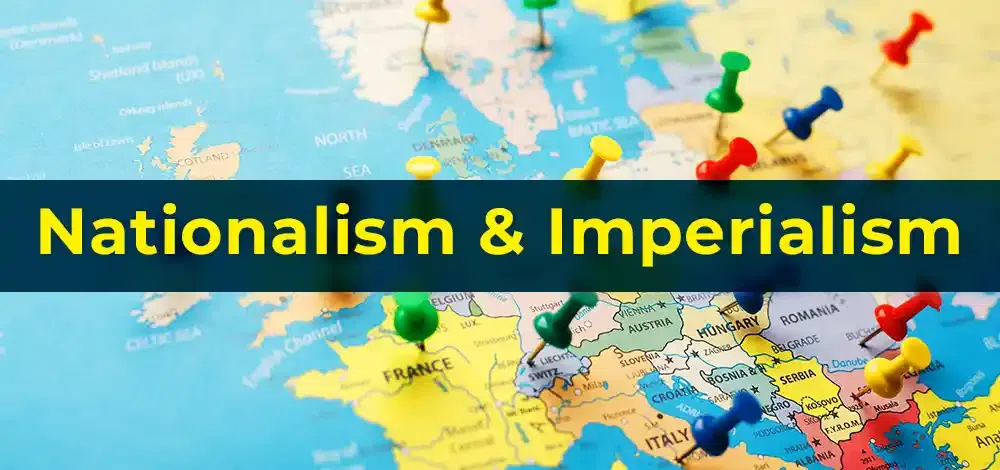Nationalism and Imperialism – Chapter 1 CBSE Class 10 History
Last Updated :
13 Apr, 2023
The French revolution that started in the late eighteenth century created a sense of collective identity and promoted nationalism for the noble purpose of creating a democratic nation where fundamental rights would be practised and human rights would be given top priority.

Nationalism and Imperialism
Background to Nationalism
The noble idea carried by nationalism was distorted very soon and by the end of the nineteenth century, the ideas of liberty, equality and fraternity started fading away. Very soon the concept of nationalism got narrowed down to limited goals as nationalist groups became intolerant of each other and were even ready to go to war against each other. Big European powers took advantage of this situation and started manipulating nationalists to pursue their imperialistic aims.
Nationalism and Imperialism
The meaning and definition of nationalism and imperialism are given below:
Nationalism
Nationalism refers to the idea of one’s consciousness towards one’s nation. It is the sense of belongingness, pride and honour and promoting the spirit of the nation over the individual spirit. It gives a sense of brotherhood and fraternity among the citizens and unites them to pursue nationalistic goals over individual goals.
Imperialism
Imperialism is a type of policy followed by generally large, militarily and economically stronger countries to extend their rule over comparatively weaker and low-developed countries by acquiring territory or gradually participating in internal politics or by diplomatic means.
Nationalist Groups in Europe During the 19th Century
- The uniting of nationalists started during the French revolution. The unification was done by scholars like Frederic Sorrieu, and Rousseau whose ideas of human rights impacted the whole french nation.
- Later Jacobin club was formed by Maximilian Robespierre who took the revolution to the next level by adding more and more people.
- Another front was led by Napoleon Bonaparte who led the idea of nationalism even to the neighbouring nation.
- After the suppression of revolutionary groups secret societies were formed. Italian revolutionary Giuseppe Mazzini found two secret societies named “Young Italy” in Mersellies and “Young Europe” in Berne. The members of these societies were like-minded young men from France, Germany, Italy and Poland.
Balkans
The area of Balkan includes modern-day Albania, Bulgaria, Bosnia-Herzegovina, Croatia, Greece, Macedonia, Montenegro, Serbia and Slovenia. Balkan was majorly under the control of the ottoman empire. The spread of the idea of romantic nationalism along with the disintegration of the Ottoman empire made this region explosive.
Gradually European nationalists broke away from the control of the ottomans and declared themselves independent. Their claim of independence was based on the idea of nationality and they used their history as a reference to prove that they had been independent earlier.
Balkan as an area of Intense Conflict
- The most serious effect of nationalist tension was seen in the area of Balkan as it was a geographically and ethnically diverse area hence clashes of ideas were frequent there.
- As the people of the Balkans were trying to define their territory and independence they were also trying to gain other’s territory which later lead to serious conflict.
- The conflict got amplified and the problem became complex when big European power rivalry got involved over trade, naval, military and colonial control. Russia, Germany, England and Austro-Hungary started countering each other’s control over the Balkan which caused a series of wars and thus led to the first world war in 1914.
Imperialism vs Anti-Imperialism
During the same period, European powers were opposed by their colonial countries to gaining independence. The anti-imperialist notion developed in all countries including India due to the rising of nationalists in colonial countries which led to confrontations with imperial powers.
The confrontation resulted in severe war in almost all colonial countries. Although the immediate causes of revolts in colonial countries might differ the ultimate goal was to create an independent nation.
Conclusion
It was observed that nationalism along with imperialism led to the catastrophic events of the first world war 1914 which did not affect Europe only but the whole world. Although the source of nationalism originated in Europe and later spread to the rest of the world. The colonial countries adopted the concept of nationalism but were modified according to their purpose. Hence each nation had its own version of nationalism.
Thus it can be said that form of nationalism may be different nation wise but the idea of the nation-state was natural and universal.
FAQs on Nationalism and Imperialism
Question 1: What role does nationalism play in imperialism?
Answer:
Nationalism had pushed the governments in Britain, France, Germany and other European countries for competing for powers, nationalism motivated the imperialists for conquering new colonies before their competitors.
Question 2: What is one similarity between nationalism and imperialism?
Answer:
The similarity between nationalism and imperialism is that both led to the annexation of lands and also the formation of what came to be known as national borders.
Question 3: What is nationalism and how was it used in justification of imperialism?
Answer:
Nationalism was used as a tool for the justification of imperialism by promoting the ideas of superiority of one’s own nation and values and domination of others as necessary for the nation and civilization.
Like Article
Suggest improvement
Share your thoughts in the comments
Please Login to comment...